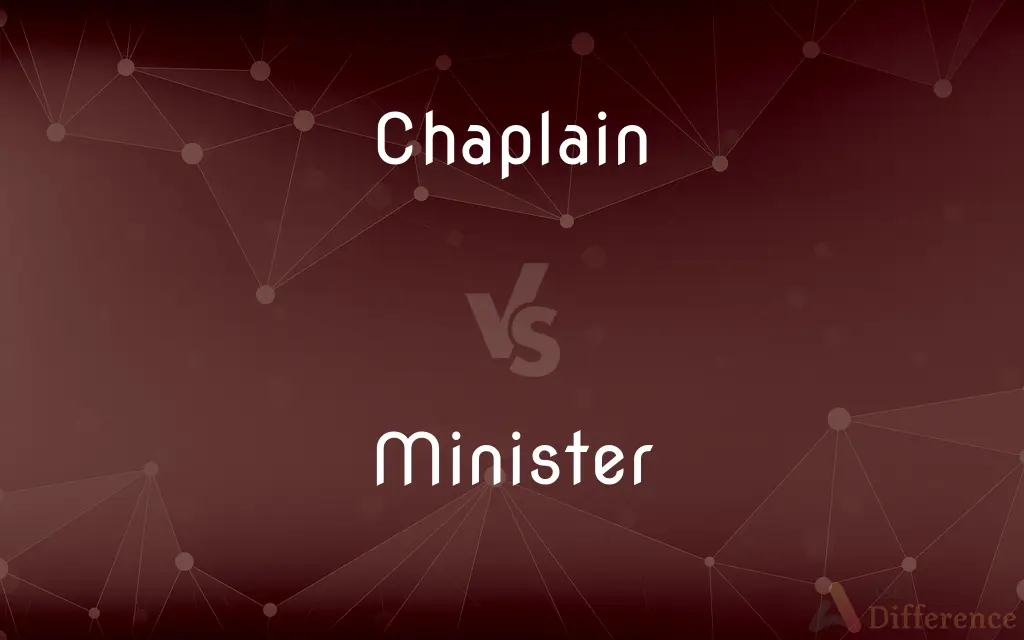Chaplain vs. Minister — What's the Difference?
By Fiza Rafique & Urooj Arif — Updated on March 29, 2024
A chaplain is a clergy member who provides religious services to secular institutions, while a minister typically leads congregations within specific religious denominations.

Difference Between Chaplain and Minister
Table of Contents
ADVERTISEMENT
Key Differences
Chaplains and ministers both play significant roles in providing spiritual support and religious guidance, but their primary contexts and functions differ. Chaplains are often associated with secular institutions like the military, hospitals, prisons, universities, and even in some corporate settings. On the other hand, ministers are more commonly found within church settings or religious communities, serving a specific congregation that belongs to a particular denomination or faith tradition.
The training for chaplains and ministers can overlap, as both usually require a foundation in theological education. However, chaplains might also undergo additional training to better serve in pluralistic environments, focusing on interfaith dialogue, counseling, and crisis intervention. Certification and endorsement by a recognized religious body or a professional chaplaincy organization might also be required for chaplains, especially when working in healthcare or the military.
The distinction between a chaplain and a minister often lies in their scope of service. Chaplains are called to minister to individuals in a variety of settings outside traditional religious institutions, and they must be equipped to address the spiritual and emotional needs of people from many different backgrounds. Ministers, while they may also provide support to people of different faiths, primarily focus on the spiritual nourishment of their congregation within the framework of their religious tradition.
Despite these differences, both chaplains and ministers share a common goal of offering spiritual guidance, support, and care. They both engage in teaching, counseling, and leading religious services, but the context of their work and the audience they serve set them apart.
Comparison Chart
Primary Setting
Secular institutions (e.g., military, hospitals)
Religious communities or congregations
ADVERTISEMENT
Role
Provides spiritual support to individuals of diverse faiths
Leads worship, performs sacraments, and provides pastoral care within a specific faith tradition
Training
Theological education, plus additional training for interfaith and crisis support
Theological education focused on denominational doctrines and practices
Certification
Often requires endorsement by a recognized body
Ordination within their denomination
Scope of Service
Broad, serving people of all faiths
Focused on members of their own faith community
Compare with Definitions
Chaplain
Serves in secular settings.
The chaplain at the hospital provided comfort to families of all faiths.
Minister
Serves in religious settings.
The minister led Sunday worship at the local church.
Chaplain
Provides interfaith support.
As a military chaplain, she facilitated services for soldiers from various religious backgrounds.
Minister
Trained in denominational practices.
She received her theological education at a denominational seminary.
Chaplain
Requires diverse training.
He completed his chaplaincy certification, focusing on crisis intervention.
Minister
Focuses on congregational care.
The minister visited congregants at home for pastoral care.
Chaplain
Endorsed by religious or professional bodies.
The chaplain was endorsed by a national chaplaincy board.
Minister
Ordained by their denomination.
After completing his studies, he was ordained as a minister.
Chaplain
Supports individuals in specific environments.
The university chaplain organized interfaith dialogues on campus.
Minister
Engages in religious teachings.
The minister held a weekly Bible study group for young adults.
Chaplain
A chaplain is, traditionally, a cleric (such as a minister, priest, pastor, rabbi, purohit, or imam), or a lay representative of a religious tradition, attached to a secular institution (such as a hospital, prison, military unit, intelligence agency, embassy, school, labor union, business, police department, fire department, university, sports club), or a private chapel. Though originally the word chaplain referred to representatives of the Christian faith, it is now also applied to people of other religions or philosophical traditions, as in the case of chaplains serving with military forces and an increasing number of chaplaincies at U.S. universities.
Minister
One who is authorized to perform religious functions in a Christian church, especially a Protestant church.
Chaplain
A member of the clergy attached to a chapel.
Minister
Roman Catholic Church The superior in certain orders.
Chaplain
A member of the clergy who conducts religious services for an institution, such as a prison or hospital.
Minister
A high officer of state appointed to head an executive or administrative department of government.
Chaplain
A lay person who is appointed to provide spiritual leadership and counseling to members of an institution, as at a university.
Minister
An authorized diplomatic representative of a government, usually ranking next below an ambassador.
Chaplain
A member of the clergy who is connected with a royal court or an aristocratic household.
Minister
A person serving as an agent for another by carrying out specified orders or functions.
Chaplain
A member of the clergy attached to a branch of the armed forces.
Minister
To attend to the wants and needs of others
Volunteers ministered to the homeless after the flood. See Synonyms at tend2.
Chaplain
A member of a religious body who is (often, although not always, of the clergy) officially assigned to provide pastoral care at an institution, group, private chapel, etc.
Minister
To perform the functions of a cleric.
Chaplain
A person without religious affiliation who carries out similar duties in a secular context.
Minister
To administer or dispense (a sacrament, for example).
Chaplain
An ecclesiastic who has a chapel, or who performs religious service in a chapel.
Minister
A person who is trained to preach, to perform religious ceremonies, and to afford pastoral care at a Protestant church.
The minister said a prayer on behalf of the entire congregation.
Chaplain
A clergyman who is officially attached to the army or navy, to some public institution, or to a family or court, for the purpose of performing divine service.
Minister
A politician who heads a ministry (national or regional government department for public service).
He was newly appointed to be Minister of the Interior.
Chaplain
Any person (clergyman or layman) chosen to conduct religious exercises for a society, etc.; as, a chaplain of a Masonic or a temperance lodge.
Minister
In diplomacy, the rank of diplomat directly below ambassador.
Chaplain
A clergyman ministering to some institution
Minister
A servant; a subordinate; an officer or assistant of inferior rank; hence, an agent, an instrument.
Minister
(transitive) To attend to (the needs of); to tend; to take care (of); to give aid; to give service.
Minister
To function as a clergyman or as the officiant in church worship
Minister
To afford, to give, to supply.
Minister
A servant; a subordinate; an officer or assistant of inferior rank; hence, an agent, an instrument.
Moses rose up, and his minister Joshua.
I choseCamillo for the minister, to poisonMy friend Polixenes.
Minister
An officer of justice.
I cry out the on the ministres, quod he,That shoulde keep and rule this cité.
Minister
One to whom the sovereign or executive head of a government intrusts the management of affairs of state, or some department of such affairs.
Ministers to kings, whose eyes, ears, and hands they are, must be answerable to God and man.
Minister
A representative of a government, sent to the court, or seat of government, of a foreign nation to transact diplomatic business.
Minister
One who serves at the altar; one who performs sacerdotal duties; the pastor of a church duly authorized or licensed to preach the gospel and administer the sacraments.
Minister
To furnish or apply; to afford; to supply; to administer.
He that ministereth seed to the sower.
We minister to God reason to suspect us.
Minister
To act as a servant, attendant, or agent; to attend and serve; to perform service in any office, sacred or secular.
The Son of man came not to be ministered unto, but to minister.
Minister
To supply or to things needful; esp., to supply consolation or remedies; as, to minister to the sick.
Canst thou not minister to a mind diseased?
Minister
A person authorized to conduct religious worship
Minister
A person appointed to a high office in the government;
Minister of Finance
Minister
A diplomat representing one government to another; ranks below ambassador
Minister
The job of a head of a government department
Minister
Attend to the wants and needs of others;
I have to minister to my mother all the time
Minister
Work as a minister;
She is ministering in an old parish
Common Curiosities
Do chaplains perform religious ceremonies?
Chaplains may perform religious ceremonies appropriate to the faiths of the individuals they serve, often adapting to interfaith contexts.
How do ministers support their congregation?
Ministers support their congregation through worship services, pastoral care, teaching, and community leadership.
Is a chaplain assigned to a specific religion?
While chaplains may come from a specific religious background, they are trained to provide support to individuals of various faiths.
What kind of institutions hire chaplains?
Military, hospitals, prisons, universities, and some corporations hire chaplains to provide spiritual support to their members or employees.
Can anyone become a chaplain?
Becoming a chaplain requires a combination of theological education, endorsement from a recognized body, and training in providing interfaith and crisis support.
Do ministers have to work within a church?
While ministers typically serve within church settings, they may also work in chaplaincy roles, mission work, or other ministries outside the traditional church environment.
Can a chaplain lead a congregation?
Chaplains primarily focus on serving individuals in non-church settings, but they may lead worship or religious services within their institutional roles.
Can a minister also serve as a chaplain?
Yes, a minister can serve as a chaplain if they receive the additional training and endorsement required for chaplaincy.
Are chaplains paid for their services?
Chaplains working in institutions like the military or hospitals are often paid employees, while some volunteer their services in other settings.
What distinguishes chaplaincy from pastoral ministry?
Chaplaincy is characterized by its service to a broad, interfaith audience in secular institutions, while pastoral ministry is focused on serving and leading a specific religious congregation.
Share Your Discovery

Previous Comparison
Hours vs. Hrs
Next Comparison
Carbon vs. CharcoalAuthor Spotlight
Written by
Fiza RafiqueFiza Rafique is a skilled content writer at AskDifference.com, where she meticulously refines and enhances written pieces. Drawing from her vast editorial expertise, Fiza ensures clarity, accuracy, and precision in every article. Passionate about language, she continually seeks to elevate the quality of content for readers worldwide.
Co-written by
Urooj ArifUrooj is a skilled content writer at Ask Difference, known for her exceptional ability to simplify complex topics into engaging and informative content. With a passion for research and a flair for clear, concise writing, she consistently delivers articles that resonate with our diverse audience.














































